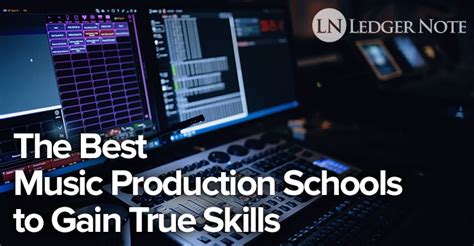Are you an aspiring musician with a passion for music production? Do you dream of creating the next chart-topping hit or producing award-winning albums? If so, then a music production program at a top US university might be the perfect step towards achieving your goals. In this blog post, we’ll explore the world of music production education and the opportunities available at some of the best universities in the US. From state-of-the-art facilities to internship opportunities and renowned faculty expertise, there is no shortage of resources and support for students looking to master the art of music production. Join us as we delve into the importance of music production education, the curriculum of these programs, and the success stories of graduates who have gone on to make their mark in the music industry. Whether you’re considering a career in music production or looking to compare programs at different universities, this blog post has everything you need to know.
Table of Contents
Top US universities offering music production programs
When it comes to pursuing a career in music production, selecting the right university can be crucial to one’s success. Fortunately, there are several top-tier universities in the United States that offer outstanding music production programs.
Berklee College of Music, located in Boston, Massachusetts, is renowned for its state-of-the-art facilities and industry connections. The college’s music production program provides students with hands-on experience in recording studios and access to cutting-edge equipment.
Another leading institution is the Clive Davis Institute of Recorded Music at NYU, which offers a unique and comprehensive curriculum designed to train the next generation of music producers. The program emphasizes creativity, entrepreneurship, and technical proficiency.
University of Southern California’s Thornton School of Music is also highly regarded for its music production programs. With a focus on both the artistic and technical aspects of music production, USC offers students a well-rounded education that prepares them for a successful career in the industry.
Importance of music production education for aspiring musicians
Music production education is a crucial aspect for anyone looking to make a career in the music industry. Aspiring musicians need to understand the technical and creative aspects of producing music, and a formal education in this field can provide them with the necessary skills and knowledge to succeed in the competitive music industry.
One of the key reasons why music production education is important for aspiring musicians is the opportunity to learn from experienced professionals. In a structured program, students can benefit from the expertise of faculty members who have real-world experience in music production. This mentorship can be invaluable in honing their craft and understanding the nuances of the industry.
Additionally, an education in music production provides aspiring musicians with access to state-of-the-art facilities and equipment. From recording studios to digital workstations, students can gain hands-on experience with the tools and technologies used in the industry. This practical training can help them develop a solid foundation in music production techniques and workflows.
Moreover, music production education also provides aspiring musicians with networking opportunities. Through internships, industry events, and collaborations with fellow students, they can connect with industry professionals and peers, expanding their professional network and gaining valuable insights into the music business.
Exploring the curriculum of music production programs
When it comes to pursuing a career in music production, it is essential to have a thorough understanding of the curriculum offered in different programs. The courses included in the curriculum play a crucial role in developing the necessary skills and knowledge required in the industry.
Music production programs typically cover a wide range of topics such as audio engineering, sound design, music theory, recording techniques, mixing, and mastering. Students also delve into the use of industry-standard software and equipment to gain practical experience.
Additionally, students may have the opportunity to explore specialized areas within music production, such as live sound production, electronic music production, or film scoring. These specializations allow students to tailor their learning experience according to their interests and career goals.
Furthermore, the curriculum often includes collaborative projects and real-world scenarios to provide students with hands-on experience. This may involve working on music production for artists, bands, or other media projects, offering valuable insight into the demands of the industry.
State-of-the-art facilities in music production programs
When it comes to pursuing a career in music production, having access to state-of-the-art facilities is crucial for developing the necessary skills and expertise. Many top US universities offering music production programs pride themselves on providing students with cutting-edge equipment and resources to enhance their learning experience.
From professional recording studios equipped with advanced sound mixing and editing software to specialized labs for electronic music production, these facilities are designed to mimic real-world industry environments. This allows students to gain hands-on experience and learn from industry professionals while honing their craft.
Furthermore, state-of-the-art facilities often include access to a wide range of musical instruments, audio equipment, and production tools. This enables students to experiment with different soundscapes and techniques, pushing the boundaries of their creativity and technical abilities.
By offering students access to these modern facilities, universities are preparing them for the demands of the music production industry, where proficiency with the latest technology is a must. With these resources at their disposal, aspiring music producers can truly immerse themselves in their passion and build the skills needed to succeed in this competitive field.
Internship opportunities to enhance practical skills
Internship opportunities are a crucial aspect of any music production program, as they provide students with real-world experience and the chance to apply their knowledge in a professional setting. These opportunities allow students to gain hands-on experience in recording studios, live sound venues, post-production facilities, or music production companies.
Students should seek out internships that align with their specific interests within the music production field, whether it be audio engineering, mixing, mastering, or music business. By working closely with industry professionals, students can learn valuable skills and techniques that are essential for a successful career in the music industry.
Many universities offering music production programs have established relationships with recording studios, production companies, and entertainment firms, providing students with access to a wide range of internship opportunities. These partnerships can lead to valuable networking connections and potential job opportunities upon graduation.
Overall, internships play a crucial role in enhancing practical skills and preparing students for the competitive music production industry. They provide an invaluable opportunity for students to gain real-world experience, build their professional network, and jumpstart their careers in the music industry.
Famous alumni from music production programs
Many music production programs boast impressive lists of alumni who have gone on to achieve great success in the music industry. These individuals have used the skills and knowledge they gained from their education to make their mark on the world of music.
One such alumnus is Jimmy Iovine, who graduated from the music production program at the University of Southern California. Iovine went on to become a renowned producer and co-founder of Interscope Records, where he played a pivotal role in the careers of numerous iconic artists.
Another notable graduate is Sylvia Massy, who attended the music production program at Evergreen State College. Massy has achieved widespread acclaim for her work as a producer and engineer, having collaborated with artists such as Tool, Red Hot Chili Peppers, and Johnny Cash.
These alumni serve as shining examples of the potential that can be unlocked through a quality music production education, inspiring aspiring producers and engineers to follow in their footsteps.
Faculty expertise and industry connections
When choosing a music production program, it’s important to consider the expertise of the faculty members. The industry connections and real-world experience they bring to the table can make a significant impact on your education and future career prospects.
Faculty members with extensive experience in the music industry can provide valuable insights and guidance to students. Whether they are former music producers, sound engineers, or successful artists, their expertise can enrich the learning experience and help students gain a deeper understanding of the industry.
In addition to their own professional backgrounds, faculty members with strong industry connections can open doors for students. They can provide networking opportunities, connect students with potential employers, and even bring industry professionals into the classroom as guest speakers or mentors.
Ultimately, a strong faculty with industry connections can make a music production program more dynamic and relevant to the current state of the industry. Students can benefit from the wisdom and guidance of experienced professionals, as well as gain access to valuable industry resources and opportunities.
Scholarships and financial aid options available
Aspiring musicians who are passionate about pursuing a career in music production often face financial challenges when it comes to obtaining a formal education in this field. However, there are various scholarships and financial aid options available to help alleviate the burden of tuition costs and other expenses.
Many music production programs at universities in the US offer scholarships specifically tailored to students majoring in this field. These can range from merit-based awards for academic excellence to need-based scholarships for those with demonstrated financial need. It’s important for prospective students to research and apply for these opportunities to make their education more affordable.
In addition to scholarships, there are also financial aid options such as grants, loans, and work-study programs that can help students finance their education. Universities often have financial aid offices and counselors who can assist students in navigating these options and determining the best course of action for their individual circumstances.
By taking advantage of these scholarships and financial aid options, aspiring musicians can pursue their passion for music production without being burdened by the high costs of education, allowing them to focus on honing their skills and achieving their career goals.
Success stories of graduates from music production programs
Many aspiring music producers wonder if pursuing a music production program is worth it. Well, the success stories of graduates from these programs speak for themselves. These individuals have gone on to achieve great success in the music industry, thanks to the education and training they received during their studies.
One such success story is that of John Smith, who graduated from XYZ University’s music production program. He now works as a highly sought-after music producer, having worked with some of the biggest names in the music industry. John attributes much of his success to the hands-on training and mentorship he received during his time in the program.
Another graduate, Amy Johnson, has made a name for herself as a music supervisor for film and television. Her time in the music production program not only honed her technical skills but also provided her with valuable industry connections that have been instrumental in her career.
These success stories are just a glimpse of the many graduates who have found fulfilling and lucrative careers in music production after completing their programs. The education and experiences gained during their studies have set them up for success in a competitive and ever-evolving industry.
Comparing music production programs in different universities
When looking to pursue a career in music production, choosing the right university and program is crucial for aspiring musicians and producers. With an increasing number of universities offering music production programs, it can be overwhelming to decide which program best suits your interests and career goals. In this blog post, we will compare music production programs in different universities to help you make an informed decision.
One of the key factors to consider when comparing music production programs is the curriculum. Each university may have a different approach to teaching music production, with some focusing more on technical skills while others emphasize creativity and artistic expression. It is important to research and compare the course offerings, including music theory, sound engineering, digital audio production, and post-production techniques, to ensure that the program aligns with your interests and career aspirations.
In addition to the curriculum, the state-of-the-art facilities and equipment available at each university can greatly impact the learning experience. Look for universities that have well-equipped recording studios, soundproof practice rooms, and industry-standard software and hardware. These facilities provide students with hands-on experience and the opportunity to work with professional-grade equipment, preparing them for the demands of the music industry.
Furthermore, exploring internship opportunities and industry connections offered by music production programs can give you valuable practical experience and networking opportunities. Some universities may have partnerships with recording studios, record labels, and production companies, providing students with internships and mentorship opportunities in the music industry. It is important to compare the internship programs and industry connections of different universities to determine which program can offer you the best support in launching your career in music production.






